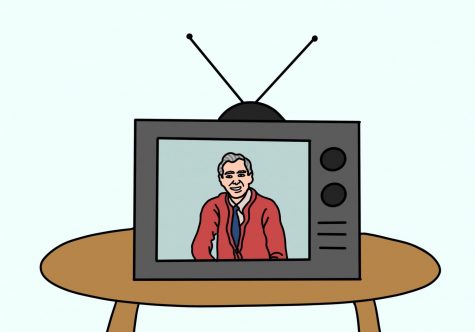Can wholesome media help adults?
Mr. Rogers’ legacy of wholesome entertainment
February 19, 2020

Young people growing up in the digital age must navigate a world overflowing with instant entertainment and information battling for their attention. Social media and 24-hour news thrives on feedback loops of positive and negative emotions. The psychology of media consumption trends is poorly understood, but record numbers of Americans today suffer from poor mental health and low access to mental health resources.
The need for accessible solutions to declining mental and emotional health has been met with a boom of auditory media such as ASMR, podcasts and popular meditation apps like Calm, Headspace and Insight Timer. These kinds of meditative audio are marketed as tools for better sleep, anxiety management, focus and emotional control.
Research cited by the National Institutions of Health has found mindfulness meditation can decrease negative psychological symptoms in people with chronic illness, anxiety and depression, but it is not immediately clear how different forms of media relate to meditation.
The psychological effects of visual media are a complex topic in contemporary culture. Adults growing up with cell phones worry about the dangers of excessive screen time, while many young adults find watching gentle TV personalities like Bob Ross and Fred Rogers therapeutic.
Fred Rogers, a Presbyterian minister drawn to child development, believed prosocial TV programs could help children in emotionally unstable environments grow into emotionally and socially mature adults. Premiering in 1968, the songs and stories of “Mister Rogers’ Neighborhood” gave children useful techniques for managing their own emotions — worries, misunderstandings, anger, joy — and his conversational relationship with the viewer made him a unique constant in many children’s lives.
Rogers’ goal of offering a wholesome alternative was driven by his belief that, “what we see and hear on the screen is part of who we become.” The impact of television on children remains a hot topic in public discourse and childhood development research.
“Communication Research” found in 2016 that pro-social television shows may help develop children’s moral intuitions, and psychologists Adelia Moore and Geoff MacDonald suggest the kind of inclusive attention Rogers gave to his audience is key to wellness as social creatures.
Over the last few years, exploring Rogers’ life and legacy has been its own phenomenon. The biopic “Won’t You Be My Neighbor?” was the most successful biographical documentary ever produced.
The Atlantic named “Finding Fred” the top podcast of 2019, a podcast that attempts to bridge Americans’ current fears and divisions with the concerns “Mister Rogers’ Neighborhood” addressed in its earliest episodes: the societal turmoil of the Vietnam War and the Civil Rights Movement.
The host, Carvell Wallace, tries to understand the personal philosophy that drove Rogers to have such a universally positive impact on several generations of children. Wallace also wants to know what Rogers’ lessons and example can teach adults.
“It’s not particularly compelling.The approach that he brought to children’s television just didn’t translate to adult television,” Maxwell King, biographer of “Mister Rogers’ Neighborhood,” said.
If you have turned on a television or a computer in the last twenty years, you might notice that entertainment for adults still looks very different from Rogers’ ideal. Contemporary entertainment is bookended by high drama serials like “Breaking Bad” or “Game of Thrones”, and the compulsive binge watching of Netflix comedies, TikToks, and YouTube rabbit holes.
Successful entertainment’s current appeal is high-octane and low downtime. The last thing to expect today is a show for adults with the slow-paced, gentle Rogers format to get greenlit. But incredibly it did — on Adult Swim.
Cartoon Network’s late-night block, Adult Swim, dominates the young adult TV demographic. It unabashedly hosts Eric Andre’s absurd, anarchy-based talk show “The Eric Andre Show,” the nihilistic, cult hit sci-fi cartoon “Rick and Morty,” plus a plethora of unnerving series and shorts.
In the midst of Adult Swim’s culture of cynicism, the slice-of-life comedy “Joe Pera Talks with You” replaces shock value with genuineness. The first iteration of comedian Joe Pera’s show is his 2016 animated short “Joe Pera Talks You to Sleep,” a mix of calming sounds and bittersweet insights.
The two-season series “Joe Pera Talks with You” invites viewers to further explore Pera’s world. His character, a Michiganian middle school choir teacher, embodies joy for life’s mundanity while also overcoming personal dilemmas often created by his stiff demeanor and extreme politeness.
Similar to Mister Rogers’ personalized approach, the audience has a special connection to Pera’s subtle warmth. Pera regularly explains his thoughts to the camera and kicks off episodes by waving and saying, “Hello! My name is Joe Pera.”
In season one, Pera takes viewers into topics like navigating a diner breakfast, considering the ethics of jack-o’-lantern disposal, getting a good night’s sleep during a lightning storm, and sharing the experience of hearing “Baba O’Riley” for the first time. The show is as cozy as it is odd.
Though the show could be written off as a funny exploration of a kind, feel-good character at first glance, the second half of season one deepens the philosophical stakes and asks the audience to consider how they process the world. Pera has to find a balance between his hopeful congeniality and encroaching neurotic worries about the world.
Though the kinds of shows “Mister Rogers” hoped for are rare, the opportunities to introspect are flourishing. In a time so interconnected and demanding of attention, wholesome media can help people recalibrate what is important, open up a space to slow down and look inward.

























































































